Almost every company and business has a website today – and for good reason. Anyone who wants to know more about you, or the products or services you provide, is going to search for you online. A well designed, user-friendly website helps ensure prospective clients convert to long-term customers.
Download our free HOA website template/guide
Now, a homeowners association isn’t exactly like a business, but there are many similarities. HOAs must keep homeowners informed, collect payments (in the form of fees or dues) and advertise the community to prospective homebuyers. These are just a few of the many reasons why HOAs are strongly encouraged to have their own community website.
Table of contents
- How a website can help HOAs operate with fewer glitches
- Some states have made websites mandatory for associations
- Why don’t more HOAs have websites?
- Getting a custom website
- Make sure you get these 5 features
- 5 examples of great HOA websites
- What makes a great website
- Costs
- Conclusion
How a website can help HOAs operate with fewer glitches
An HOA website acts as a secure platform for sharing and receiving essential information like news, announcements, notices, forms, governing documents, resources, directories, and more. Instead of having to ask management or the board about upcoming member meetings or request an architectural change form, owners can log on to the association’s website and immediately get everything they need from one place.
The best websites will have a secure portal or page that only members can access. This helps with information sharing while being mindful of security and privacy.
Public photos of events, amenities and the HOA can also be shared to showcase the best of your community and entice prospective buyers. It’s an affordable and effective way to advertise.
Administrative tasks, such as maintenance requests or payments, can be streamlined and automated when they are brought online. Best of all, having an online system keeps everyone more accountable. Once a payment is made or a request is submitted, proof of that action is immediately available to management and owners.
Some states have made websites mandatory for associations
In some states, websites are actually required for larger communities. In Florida, if your condo association has 150 or more units, then it must have a website that complies with specific requirements (timeshare units are excluded).
Texas just put a similar rule into effect for HOAs with at least 60 lots, or any association under contract with a management company. These HOAs must make the most current version of the association’s “dedicatory instruments” relating to the association or subdivision—and filed in the county deed records—available on an internet website. Information must be maintained by the association or management company working for the HOA; it must be made available to all members.
When it comes to maintaining a happy and efficient HOA, communication is key. User-friendly technology has given HOAs an opportunity to improve connectivity and engagement. A website is one tool that will help HOA members to stay informed and involved. Apathy can lead to a fractured and stagnant HOA; a website encourages the opposite.
Why don’t more HOAs have websites?
Websites have come a long way, and with so many DIY platforms available, it’s become much easier to make one. But some boards may still be apprehensive about having a community website, while others may be worried about the time or costs involved in maintaining it. These are valid concerns, and it is important to discuss the following points with your HOA board before you move forward with getting a website:
- What problems will the website aim to solve for owners, board members and management?
- Can (and should) the HOA maintain the website on its own?
- How much can the association afford to spend on a website? There are hosting fees and maintenance fees to consider in addition to the initial cost of the site
- Has the board spoken with an attorney about the website and what information should be gated?
- What are the requirements of the association? What features would it like the website to have?
- Does the state or municipality have any requirements when it comes to HOA websites?
- Can the website integrate with any of our current online systems?
- Is there an HOA software company that could offer more options and features?
Getting a custom website
If the budget is available, many HOAs will elect to have someone else build their website for them. It’s usually a less stressful process when there’s a professional taking care of the hard stuff. While there are dozens of exceptional web designers out there, it can be hard to find the right one for your community.
Consider taking a less traditional route and hiring an HOA software company to build a custom site for you. Condo Control has a professional in-house designer available, and we work exclusively with residential communities. That means we’re in a better position to build an HOA-specific website than other developers.
Furthermore, we’ll make sure that owners have a password-protected section where they can easily find community news and information. Owners also have the option to login to their personal Condo Control account directly from the HOA website. From there, they can make online payments, book amenities, submit service requests/ architectural change forms and much more.
Make sure you get these 5 features
Your HOA website should be built based around the specific needs and goals of your community. That may mean you only need a few pages. Conversely, you may require multiple pages if your owners prefer to get documents and information online.
That being said, most communities will want to have the following features available to owners:
Desktop and mobile-friendly design
Your website must be available through mobile and desktop. Mobile traffic accounts for almost half of web traffic worldwide. According to Statista, In the first quarter of 2021, mobile devices (excluding tablets) generated 54.8% of global website traffic. Basically, more and more people are visiting websites through their phones. The convenience and ease of access means this trend will continue.
Community calendar
One of the best ways to ensure your owners show up to events is to integrate a community calendar right into the website. This is an easy way to keep everyone in the loop. When used collaboratively with HOA management software, admins can add events from the system and include details for meetings, social activities and even things like garbage pickup. These activities will then appear on the website calendar. Plus events can be added ahead of time or as they come up – it’s a flexible and simple solution.
Document storage
Giving owners 24/7 access to forms and governing documents, or board members a place where they can store and review every item relating to HOA business, is a gamechanger. Trying to keep papers organized is a lot of work, and trying to locate that one item you need in a file cabinet of folders is even harder. With online document storage, owners simply need to log in to the password protected area of the website, enter a keyword and they should be able to find what they’re looking for in seconds.
Resident maintenance requests
Since we’re keeping with the theme of simplifying and streamlining processes, online resident maintenance requests is another must-have website feature. Digital forms can be submitted by owners, and they can do this while they’re watching tv or commuting to work (since your site is mobile friendly). Management can see when new forms are submitted and request to receive notifications if they forget to follow up after a certain number of days.
Digital bulletin board and announcements
Communication is often the biggest issue impacting HOA communities. Sometimes, management thinks they are sharing enough, but owners still want more. Having an online system to post updates, notices and other information is an effective, cost-efficient solution. Messages can be created and shared in seconds, and associations forgo the print and mailing costs. Management can include links and attachments with these messages, too. Set expiry dates for time-sensitive announcements, or keep them up on the board for the entire year.
5 examples of great HOA websites
Below are some great examples of simple, user-friendly websites:
Lake Linganore Association
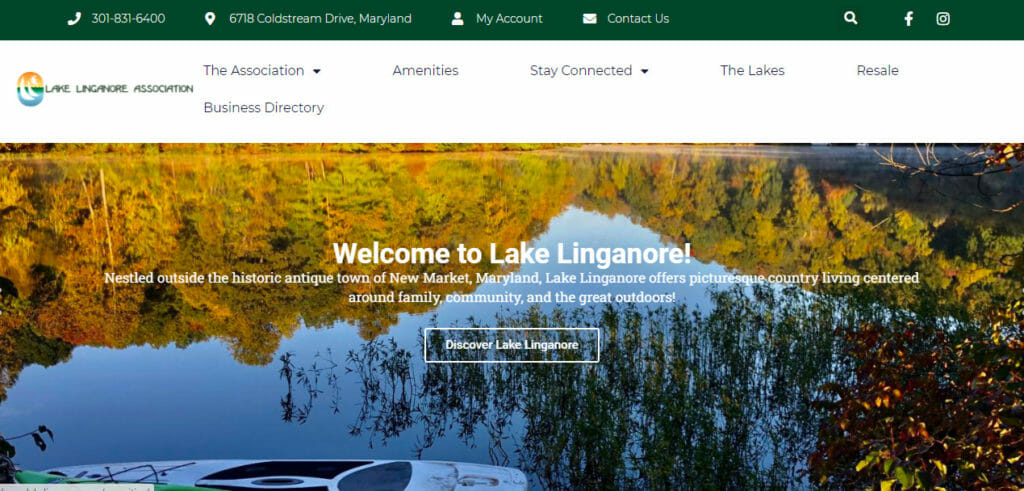
About the association
Lake Linganore is a very large association located in Maryland. It has dozens of private amenities available to users, including beaches, basketball courts, a dog park and even an events tent. Lake Linganore water is used as the primary source of drinking water for the City of Frederick, and it’s the emergency back-up water supply for Frederick County. It holds over 500-million gallons of water!
Why we like this website
The Lake Linganore site is very easy to navigate. There is contact information listed on the site, and a few small dropdown menus so as not to overwhelm the user. The visuals are also “on-brand,” or representative of the association’s qualities and characteristics. The interactive sections, such as the amenities map and historical timeline, is a great way to attract prospects.
Solano Grove
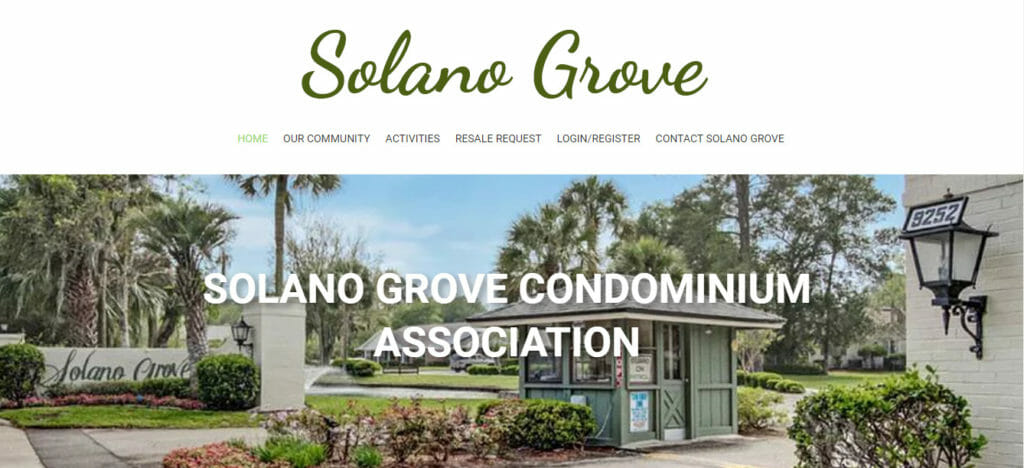
About the association
Solano Grove is a well-established community located in Jacksonville, Florida. It is an older condominium community, but that just means the units are more spacious than some of the newer builds.
Why we like this website
Solano Grove’s website offers users a clean and visually appealing space. There is just enough information; everything you need is easy to find. Owners won’t have a hard time figuring out where to login or register for the password-protected section.
Surfsong Condos
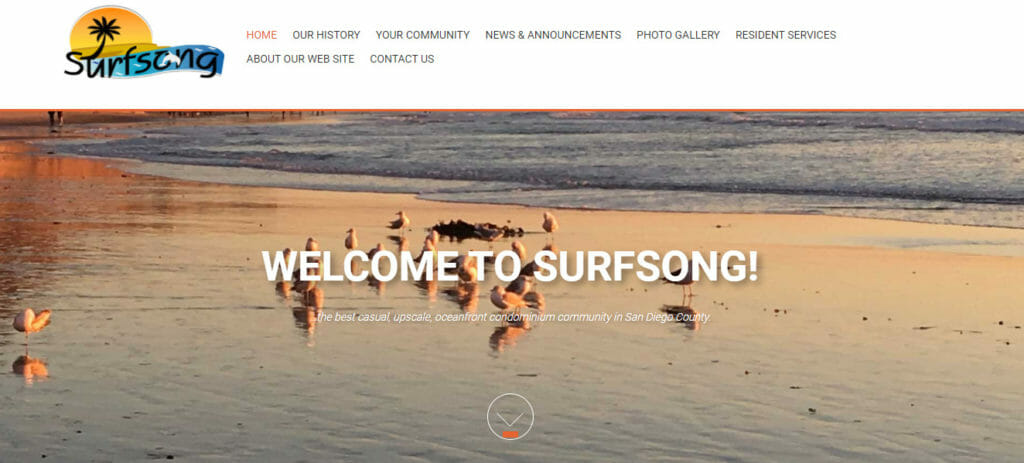
About the association
Surfsong Condos has 72 condominium units, a lovely clubhouse situated next to an oceanfront swimming pool and hot tub, and two tennis courts. Located in San Diego, atop a ninety-foot bluff overlooking the Pacific Ocean, it is a truly beautiful place to live.
Why we like this website
Surfsong’s website sets the tone for the community. It is organized, but has a fun, laidback feel too. Not only are there photos of the area, but the website also offers visitors a breathtaking video of the condo community as well.
The site encourages new owners to sign up for an account using information they would have received in their welcome letter. Moreover, it has a small list at the bottom of the website informing owners of the information they will be able to obtain on the password-protected section.
Detailed contact information for the management team can also be found at the bottom of the website so that anyone who wishes to speak with them can get in touch quickly and easily.
Deering Bay Marina
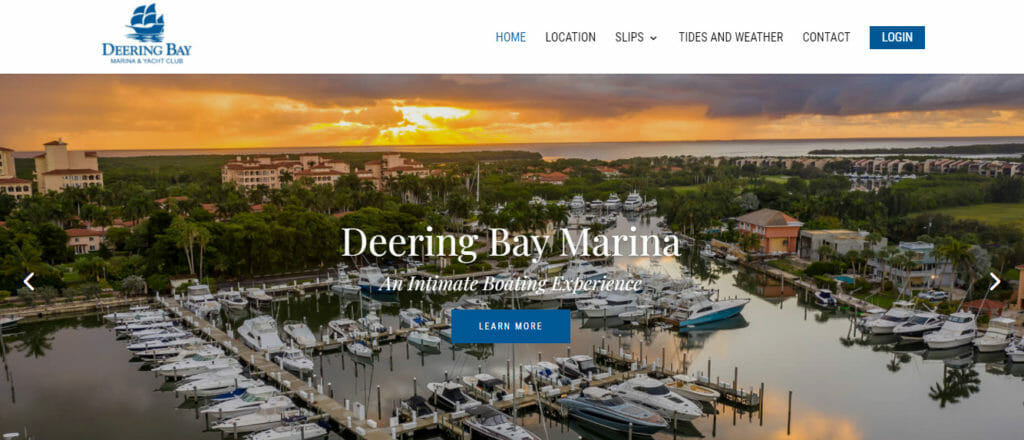
About the association
Deering Bay Marina, located in South Miami-Dade County, is a pristine marina community that caters to lovers of boating, nature, and outdoor sport. Members have access to some of the best fishing spots around.
Why we like this website
Beside the beautiful photos of this stunning marina, Deering Bay Marina’s website has lots of helpful information readily available. For example, you can check local tides and weather, and any slips that are for sale or for lease. Members can access a password-protected section of the site as well where they will get to see information and updates released exclusively for them.
The Willows HOA
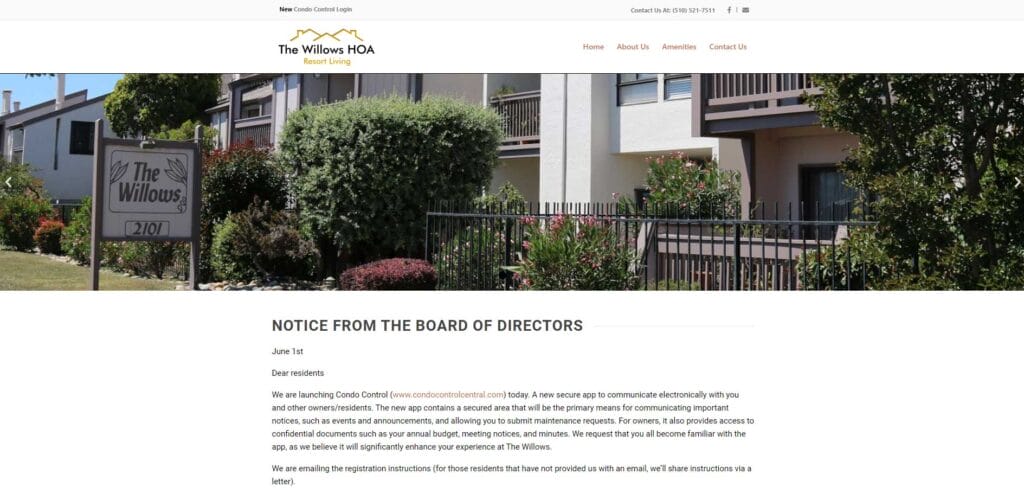
About the association
The Willows HOA Resort Living boasts the perfect climate with tranquil and beautiful landscapes bordering the Bay. The Willows’ 201 homes are adjacent to Alameda’s shopping mall. There is a large clubhouse, perfect for parties and a gym as well as an inviting pool.
Why we like this website
The design is ideal for HOAs looking for a simple, straightforward layout. Updates to the community are posted on the landing page for ease of access and immediate viewing by community members. Important HOA documents are accessible with a login from the home page. Tabs at the top take you directly to the specific page, without a long dropdown menu to scan.
Bonus: An HOA website template created by Condo Control
Condo Control offers all of the must-have features that we highlighted earlier on. Our HOA management software supports and works directly with the websites our team creates. We build professional, user-friendly websites for HOAs that want to improve communications and augment the association’s brand. Click here to see an example.
Note that we can customize even simple templates. On this one, we include amenities and information about board meetings and board members. You will also see how the events calendar looks from a resident’s perspective. Admins can update monthly calendars directly from their Condo Control account. Our goal is to showcase the very best of your community.
What makes a great website
It’s really important that your website is aesthetically pleasing. To put it bluntly, an ugly site isn’t going to encourage owners to use it. But – looks aren’t everything. A great website is fast, user-friendly, current and secure. Some of these qualities will overlap with must-have website features we mentioned earlier.
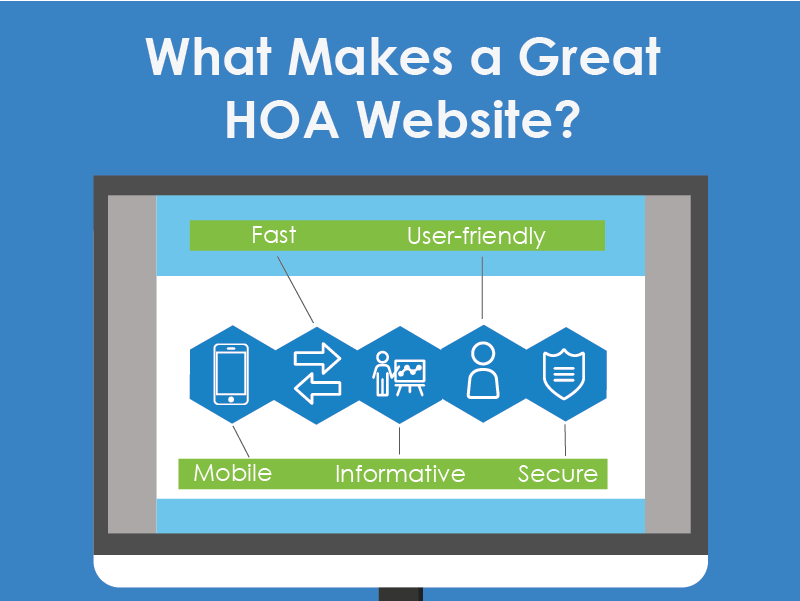
Mobile-friendly
We’ve already talked about the importance of making sure your HOA website is mobile friendly.
Fast
Our attention spans are shorter than ever, and people expect fast load times. Your website should be capable of solving problems for owners, not creating more frustrations for them. If you hire someone to build your website for you, they will be able to take the proper steps to ensure your site loads quickly without compromising on the quality of images or functionalities.
Informative
The website should have all of the resources that owners frequently ask for. This saves you and your staff time since owners will be able to do more for themselves. Announcements, governing documents, and events should be available on the password-protected section of the site.
User-friendly
The website should be easy to navigate and allow visitors to find what they are looking for right away. Simplicity trumps complexity when it comes to websites.
Secure
Security must always be prioritized. Personal and sensitive information is invaluable; HOAs must take every step possible to ensure only authorized individuals have access to this information. In addition to creating a section just for residents, be sure to Secure your site with HTTPS (Hypertext Transfer Protocol Secure).
Costs
The last aspect of HOA websites we will discuss is the costs. While you could probably find a free website template, we strongly recommend investing in a site that will offer you the most value for your investment. Free sites will be slow, may have tons of ads and they are not very customizable. Free websites will not provide a great experience for you or your owners.
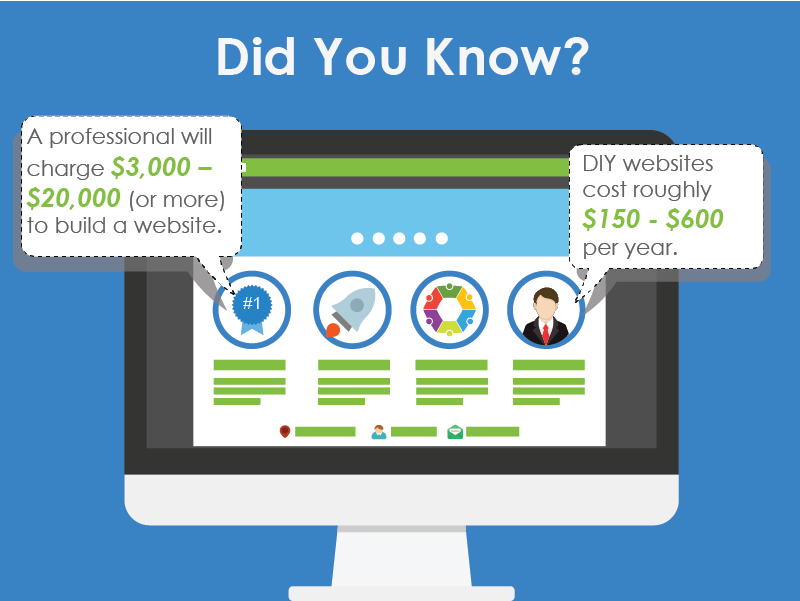
If you are fortunate enough to have a board or committee member who is comfortable with something like WordPress and a bit of code, your association might spend anywhere from $150 – $600 per year. Costs will depend on whether you build from scratch, or pay for a website builder like Wix or Squarespace.
This cost estimate takes into account things like the domain name, hosting, premium themes and add-ons. The downside here is that you are responsible for updating and maintaining everything.
Prefer to hire a professional instead? You could be charged anywhere from $3,000 – $20,000 (or more). That’s a huge range, but there are a lot of variables to consider. The skill of the developer, whether you hire a freelancer or agency to do the work, the custom features you require, add-ons like quarterly updates and any additional services will all impact the price.
Conclusion
HOA websites can act as a central resource hub for associations. Even if your owners aren’t tech-savvy, almost anyone can navigate and use a well-designed website. Plus, it doubles as an efficient advertising tool. With so many features and functions, having an HOA website just makes sense.


